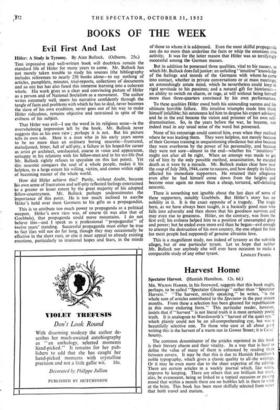BOOKS OF THE WEEK
Evil First And Last
Hider: A Study in Tyranny. By Alan Bullock. (Odhams. 25s.) Tins impressive and well-written book will doubtless remain the standard life of Hitler for many. years to come. Mr. Bullock has not merely taken trouble to study his sources (the bibliography includes references to nearly 250 books alone—to say nothing of articles, pamphlets, minutes, trial-reports, collections of documents and so on) but has also fused this immense learning into a coherent whole. His work gives us a clear and convincing picture of Hitler as a person and of National Socialism as a movement. The author writes extremely well, steers his narrative confidently through the tangle of facts and problems with which he has to deal, never becomes the slave of his own erudition, never goes out of his way to make Hitler ridiculous, remains objective and restrained in spite of the evilness of his subject.
That Hitler was evil—I use the word in its religious sense is the overwhelming impression left by the book. Mr. Bullock never suggests this as his own view ; perhaps it is not. But his picture tells its own tale. Here is a man who in his early years seems to be no more than an ordinary boring neurotic—frustrated, maladjusted, bitter, full of self-pity, a failure in his hoped-for career as artist pr architect, uneducated, coarse in voice and appearance, unhappy in his relations with his fellow-men and in his sex-life (but Mr. Bullock rightly refuses to speculate on this last point). Yet this neurotic conquers the soul of a whole people, makes it his helpless, to a large extent his willing, victim, and comes within sight of becoming master of the whole world.
How did Hitler achieve this? Partly, without doubt, because his own sense of frustration and self-pity reflected feelings entertained to a greater or lesser extent by the great majority of his adopted fellow-countrymen. Mr. Bullock perhaps underestimates the Importance of this point. He is too much inclined to ascribe Hitler's hold over most Germans to his gifts as a propagandist.
This is to attribute too much power to propaganda as a political weapon. Hitler's own view was, of course (it was also that of Goebbels), that propaganda could move mountains. I do not believe this—and I speak as a professional "propagandist" of twelve years' standing. Successful propaganda must either be true to fact (lies will not do for long, though they may occasionally be effective in the short run), or else it must appeal to already existing emotions, particularly to irrational hopes and fears, in the minds of those to whom it is addressed. Even the most skilful propaganda can do no more than underline the facts or whip the emotions into activity: It was for the latter reason that Hitler was so terrifyingly successful among the German masses.
But in addition he possessed three qualities, vital to his success, to which Mr. Bullock does full justice: an unfailing "intuitive" knowledge of the feelings and moods of the Germans with whom he came into contact, whether in private conversations or at mass meetings; an astonishingly astute mind, which he nevertheless could keep in rigid servitude to his passions; and a natural gift for histrionics— an ability to switch on charm, or rage, at will without being himself more than three-quarters convinced by his own performances, To these qualities Hitler owed both his astounding success and his ultimate horrible failure. His intuitive triumphs made him think himself infallible; his astuteness led him to despise his expert advisers; and he in the end became the victim and prisoner of his own self- dramatisation. So, in the years before the war, he became, not indeed mad in any usual sense of the word but possessed.
None of his entourage could control him, even when they realised where he was leading them. They were helpless, not merely because of their German training in unquestioning obedience but also because they were overborne by the power of his personality, and because they were not sure—almost to the end—whether his "intuitions" might not after all be right. When an attempt was made to get rid of him by the only possible method, assassination, he escaped death as it were by a miracle. Mr. Bullock makes clear how near the coup of July 20th, 1944, came to success, and how deeply its failure affected his immediate supporters. He retained their allegiance even after he had himself come down from the heights and become once again no more than a cheap, tortured, self-deluding neurotic.
There is something not ignoble about the last days of some of these supporters, notably Goebbels. But Hitler's story has no nobility in it. It is the exact opposite of a tragedy. The tragic hero, as we have always been taught, is a basically good man who falls into adversity and then shows that his goodness survives and may even rise to greatness. Hitler, on the contrary, was from the first evil; his evilness helped him to a position of unexampled glory and power; but he ended even more evil than he began—evil enough to attempt the destruction of his own country, the one object for him (so most people had supposed) of genuine altruistic love.
This is a magnificent study, not indeed of tyranny as the sub-title alleges, but of one particular tyrant. Let us hope that neither Mr. Bullock nor anybody else will ever have occasion to make a comparable study of any other tyrant. LINDLEY FRASER.


































 Previous page
Previous page